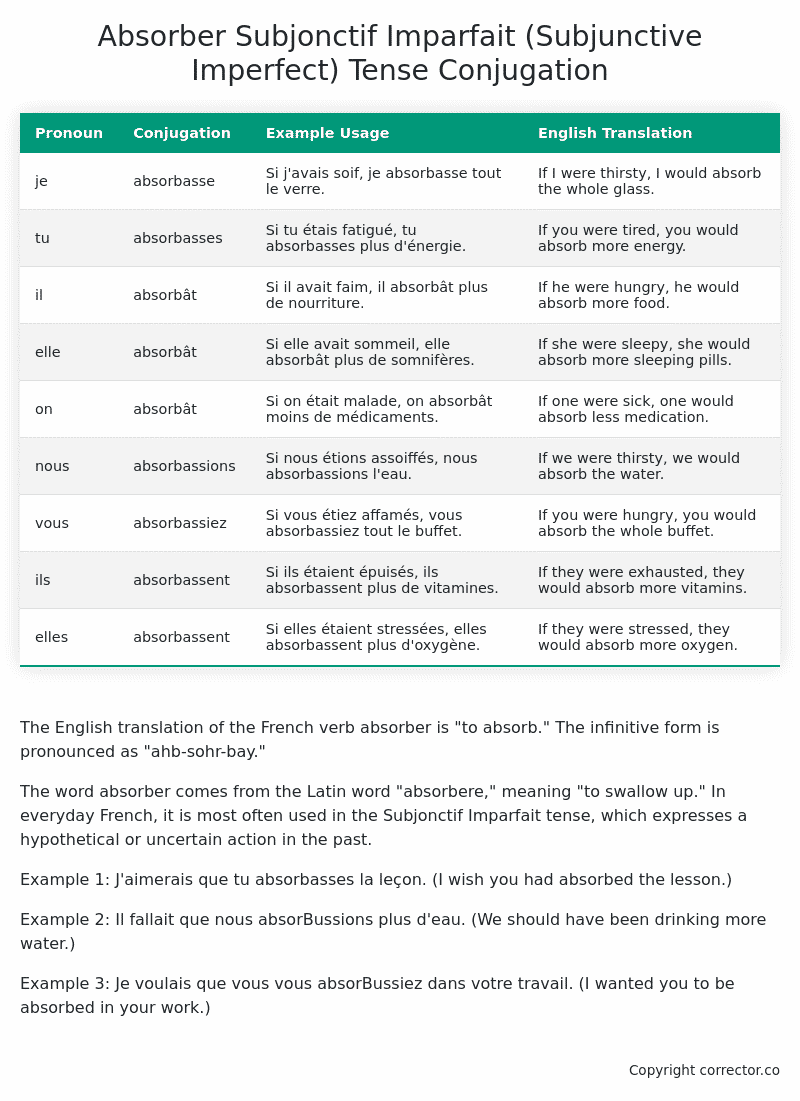Subjonctif Imparfait (Subjunctive Imperfect) Tense Conjugation of the French Verb absorber
Introduction to the verb absorber
The English translation of the French verb absorber is “to absorb.” The infinitive form is pronounced as “ahb-sohr-bay.”
The word absorber comes from the Latin word “absorbere,” meaning “to swallow up.” In everyday French, it is most often used in the Subjonctif Imparfait tense, which expresses a hypothetical or uncertain action in the past.
Example 1: J’aimerais que tu absorbasses la leçon. (I wish you had absorbed the lesson.)
Example 2: Il fallait que nous absorBussions plus d’eau. (We should have been drinking more water.)
Example 3: Je voulais que vous vous absorBussiez dans votre travail. (I wanted you to be absorbed in your work.)
Table of the Subjonctif Imparfait (Subjunctive Imperfect) Tense Conjugation of absorber
| Pronoun | Conjugation | Example Usage | English Translation |
|---|---|---|---|
| je | absorbasse | Si j’avais soif, je absorbasse tout le verre. | If I were thirsty, I would absorb the whole glass. |
| tu | absorbasses | Si tu étais fatigué, tu absorbasses plus d’énergie. | If you were tired, you would absorb more energy. |
| il | absorbât | Si il avait faim, il absorbât plus de nourriture. | If he were hungry, he would absorb more food. |
| elle | absorbât | Si elle avait sommeil, elle absorbât plus de somnifères. | If she were sleepy, she would absorb more sleeping pills. |
| on | absorbât | Si on était malade, on absorbât moins de médicaments. | If one were sick, one would absorb less medication. |
| nous | absorbassions | Si nous étions assoiffés, nous absorbassions l’eau. | If we were thirsty, we would absorb the water. |
| vous | absorbassiez | Si vous étiez affamés, vous absorbassiez tout le buffet. | If you were hungry, you would absorb the whole buffet. |
| ils | absorbassent | Si ils étaient épuisés, ils absorbassent plus de vitamines. | If they were exhausted, they would absorb more vitamins. |
| elles | absorbassent | Si elles étaient stressées, elles absorbassent plus d’oxygène. | If they were stressed, they would absorb more oxygen. |
Other Conjugations for Absorber.
Le Present (Present Tense) Conjugation of the French Verb absorber
Imparfait (Imperfect) Tense Conjugation of the French Verb absorber
Passé Simple (Simple Past) Tense Conjugation of the French Verb absorber
Passé Composé (Present Perfect) Tense Conjugation of the French Verb absorber
Futur Simple (Simple Future) Tense Conjugation of the French Verb absorber
Futur Proche (Near Future) Tense Conjugation of the French Verb absorber
Plus-que-parfait (Pluperfect) Tense Conjugation of the French Verb absorber
Passé Antérieur (Past Anterior) Tense Conjugation of the French Verb absorber
Futur Antérieur (Future Anterior) Tense Conjugation of the French Verb absorber
Subjonctif Présent (Subjunctive Present) Tense Conjugation of the French Verb absorber
Subjonctif Passé (Subjunctive Past) Tense Conjugation of the French Verb absorber
Subjonctif Imparfait (Subjunctive Imperfect) Tense Conjugation of the French Verb absorber (this article)
Subjonctif Plus-que-parfait (Subjunctive Pluperfect) Tense Conjugation of the French Verb absorber
Conditionnel Présent (Conditional Present) Tense Conjugation of the French Verb absorber
Conditionnel Passé (Conditional Past) Tense Conjugation of the French Verb absorber
L’impératif Présent (Imperative Present) Tense Conjugation of the French Verb absorber
L’infinitif Présent (Infinitive Present) Tense Conjugation of the French Verb absorber
Struggling with French verbs or the language in general? Why not use our free French Grammar Checker – no registration required!
Get a FREE Download Study Sheet of this Conjugation 🔥
Simply right click the image below, click “save image” and get your free reference for the absorber Subjonctif Imparfait tense conjugation!

Absorber – About the French Subjonctif Imparfait (Subjunctive Imperfect) Tense
Formation
Common Everyday Usage Patterns
Interactions with Other Tenses
Subjonctif Présent
Indicatif Passé Composé
Conditional
Conditional Perfect
Summary
I hope you enjoyed this article on the verb absorber. Still in a learning mood? Check out another TOTALLY random French verb conjugation!


